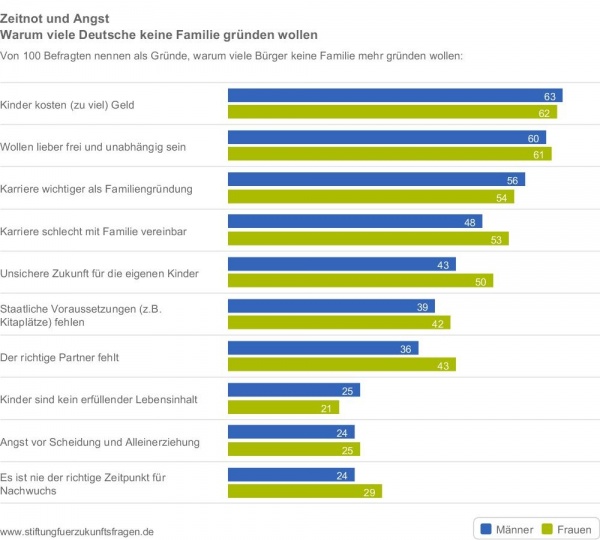About the accessibility and reachability of playgrounds
Imagine for just a moment the most beautiful playground in the world, but nobody can reach it! The accessibility standard described in DIN 18034...


YOUR FORUM FOR PLAY, SPORTS UND LEISURE AREAS

Children = no money, no freedom, no career (?)
Currently, 147 children are born for every 100 women in Germany. In comparison with other EU states, this puts Germany in 17th place, way behind other countries such as France, Sweden and the UK. And women in countries where Catholicism is predominant, such as Italy, Spain and Poland, are giving birth to even fewer children. On being asked, Germans explain their aversion to having children in terms of the associated high financial outgoings, loss of personal freedom and the difficulties of combining family with career. This is the conclusion drawn from a survey undertaken by the BAT-sponsored Foundation for Future Studies, the results of which were presented in mid-October 2016 in Hamburg. A representative sample of more than 2000 individuals in Germany was questioned in personal interviews.
The results in detail
The primary reason cited for the unwillingness to have children is the sheer expense. The German Federal Statistical Office (Destatis) calculates that a child costs on average €600 each month; in other words, parents would end up spending some €130,000 on each child until they reach the age of 18 years. It thus comes as no surprise that ‒ irrespective of age, income, gender or size of residential location ‒ almost two in every three persons surveyed (63%) stated that the financial burden was the reason for remaining childless. Over a five-year period, the corresponding figure has increased by some 10% (2011: 58%).
The reason in next place, named by 61% (roughly the same as in 2011), is the fear of losing personal freedoms. While in the past it was an above-average proportion of men who were unwilling to sacrifice their own independence, it is now more women who base their decisions on this argument.
And again it is more women than men who claim that their failure to have children is attributable to their inability to find the right partner and the difficulties they see in terms of the compatibility of family and career. It is thus apparent that the endeavours of employers to put in place more family-friendly structures over the past few years have not yet achieved the desired result. Overall, the percentage of respondents giving these reasons increased by 3% to 51%.
Another important factor is concern about the future. Almost half (46%) of those surveyed were worried what will happen with regard to the availability of jobs, economic trends, climate change and the spread of terrorism ‒ and thus assert that they have decided not to have children because of such uncertainties about what might be coming.
However, fewer individuals in Germany now seem to consider state provisions in this context are inadequate (41%); apparently the many state-sponsored projects and measures are gradually coming to fruition. The Federal government is responsible for some 150 different family policy initiatives and now puts aside more than €60 billion annually for use in direct financial support, such as child benefit, parental and care allowances payments.
It is notable that in Germany childless couples in the age range 25 to 49 years state fewer reasons for not wanting children than do parents and singles. For example, they less frequently quote concern about loss of personal freedom (5% less than the percentage for the survey population as a whole). There is only one aspect in which an overriding conviction of the childless couples is apparent ‒ they consider that it is impossible to find the right time to have children (11% more than the survey population as a whole). In the light of factors such as work and leisure, travel, interaction with friends and partnerships, many have the feeling that they would be unable or unwilling to take on the many demands and challenges that being a parent brings with it.
Professor Dr. Ulrich Reinhardt, Scientific Head of the Foundation, had this to say on the survey and on the prospects for the future: "We are living in an era that is often seen as Germany's Age of Anxiety and this has fed through into Germans' attitudes to having children. It is clear that over time there has been a significant rise in unease ‒ scores increased in eight of ten categories. Politicians and businesses need to do more to counteract these worries and fears while Germans themselves also have to learn to overcome them. The government must continue to systematically improve framework conditions and encourage people to start families. Businesses should not simply pay lip service to the concept of providing for the compatibility of career and family; they must actually put in place appropriate practical measures in the form, for example, of more part-time jobs for management personnel and the removal of career obstacles to having children. Ultimately, however, every German needs to decide for themselves whether starting a family, despite all concerns and apprehensions and the restrictions and compromises associated with family life, can offer them a better quality of life and more personal happiness than money, freedom and career. But it would appear that greater numbers of Germans are taking this view ‒ 737,575 children were born last year in Germany, a birth rate that was up 10% on that of five years ago."
For more information, go to: www.stiftungfuerzukunftsfragen.de